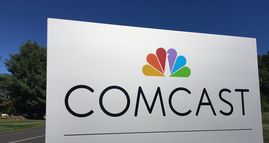Processing Your Payment
Please do not leave this page until complete. This can take a few moments.
- News
-
Editions
View Digital Editions
Biweekly Issues
- April 29, 2024
- April 15, 2024
- April 1, 2024
- March 18, 2024
- March 4, 2024
- February 19, 2024
- February 5, 2024
- January 22, 2024
- January 8, 2024
- + More
Special Editions
- Lists
- Viewpoints
- HBJ Events
- Business Calendar
- Custom Content
CT municipalities hail broadband legal victory

In a blow to major internet service providers like Comcast and Frontier, a Connecticut court has ruled that municipalities have the right to use utility poles within their borders to build out broadband internet networks to provide service to residents and businesses.
Municipal use of their reserved pole space -- known as the “municipal gain” -- has been a contentious topic in Connecticut since 2013, when the state legislature said cities and towns could use their gain “for any purpose.”
Last year, the Public Utilities Regulatory Authority (PURA) sided with Frontier, the Communication Workers of America and wireless providers, deciding that the 2013 amendment to state law had unclear intent. PURA ultimately ruled that municipalities could only use their gain space for town and school networks -- not for broadband service available to the public.
Municipalities and the state Office of Consumer Counsel (OCC) soon filed suit, seeking to overturn that interpretation. That June 2018 appeal came to its conclusion on Tuesday, when Superior Court judge trial referee Joseph M. Shortfall filed a 33-page decision vacating PURA’s May 2018 declaratory ruling.
Shortall found that the 2013 amendment to the municipal-gain statute was plain and unambiguous, and that PURA had exceeded its statutory power by basing its 2018 ruling in part on a concern that allowing competing municipal networks might be “constitutionally precarious.”
The court ruled that PURA, as an administrative agency, had “no business” considering the constitutionality of the state statute.
The court declined to remand the matter back to PURA because PURA’s interpretation of the state statute was “a product of several errors of law.”
The Connecticut Conference of Municipalities hailed the decision, calling it “a great victory.”
“The Connecticut Superior Court has issued its decision in favor of municipalities stating that the plain language of the statute does in fact provide municipalities with the right to use the municipal gain for any purpose,” CCM Executive Director Joe DeLong said in a statement. “The decision is a win for municipalities and their property taxpayers, and represents a clear, fair and reasonable reading of state statutes.”
Acting Consumer Counsel Richard Sobolewski called the decision “thorough,” and said OCC is prepared to continue to litigate the matter, should internet providers or others appeal it to a higher court.
“We are excited for municipalities that their rights to use the municipal gain to try to solve broadband access and affordability problems for their citizens and businesses have been confirmed,” Sobolewski said.
PURA chair Marissa P. Gillett, who was named to that job earlier this year, said PURA is reviewing the decision, but declined to comment on specifics.
“We thank the court and the parties for their careful consideration of this matter,” she said.
Telecom and wireless industry associations involved in the suit did not immediately respond to requests for comment Wednesday morning. Frontier released the following statement Wednesday afternoon:
"Frontier believes that the decision by the Public Utilities Regulatory Authority (PURA) was the correct one based on state and federal law, as well as principles of fair competition. We are reviewing the decision and next steps."
It’s unclear exactly what will happen next, but besides legal appeals, it’s possible the legislature may consider a change to the statute in 2020. Lawmakers declined to make a proposed tweak to the gain law earlier this year.
This story has been updated to add comment from Frontier
Related Content

2022 Giving Guide
This special edition informs and connects businesses with nonprofit organizations that are aligned with what they care about. Each nonprofit profile provides a crisp snapshot of the organization’s mission, goals, area of service, giving and volunteer opportunities and board leadership.
Learn more
Subscribe
Hartford Business Journal provides the top coverage of news, trends, data, politics and personalities of the area’s business community. Get the news and information you need from the award-winning writers at HBJ. Don’t miss out - subscribe today.
Subscribe
2024 Book of Lists
Delivering Vital Marketplace Content and Context to Senior Decision Makers Throughout Greater Hartford and the State ... All Year Long!
Read Here-
2022 Giving Guide
This special edition informs and connects businesses with nonprofit organizations that are aligned with what they care about. Each nonprofit profile provides a crisp snapshot of the organization’s mission, goals, area of service, giving and volunteer opportunities and board leadership.
-
Subscribe
Hartford Business Journal provides the top coverage of news, trends, data, politics and personalities of the area’s business community. Get the news and information you need from the award-winning writers at HBJ. Don’t miss out - subscribe today.
-
2024 Book of Lists
Delivering Vital Marketplace Content and Context to Senior Decision Makers Throughout Greater Hartford and the State ... All Year Long!
ABOUT
ADVERTISE
NEW ENGLAND BUSINESS MEDIA SITES
No articles left
Get access now
In order to use this feature, we need some information from you. You can also login or register for a free account.
By clicking submit you are agreeing to our cookie usage and Privacy Policy
Already have an account? Login
Already have an account? Login
Want to create an account? Register
Get access now
In order to use this feature, we need some information from you. You can also login or register for a free account.
By clicking submit you are agreeing to our cookie usage and Privacy Policy
Already have an account? Login
Already have an account? Login
Want to create an account? Register










0 Comments